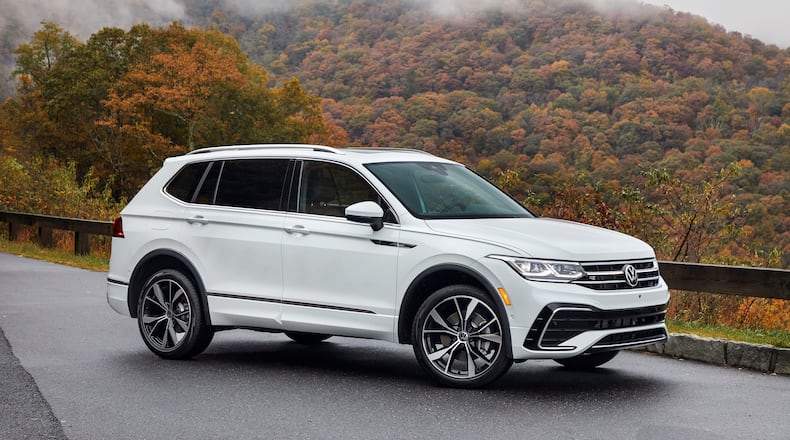Quick, can you name the best-selling Volkswagen vehicle in America? Can you even pronounce the name correctly if I told you it was the Tiguan (Tig-wān)? But yes the Tiguan, which is categorized as a compact SUV, is the German brand’s best-selling vehicle here in the United States. And, for the 2024 model year, it sees some minor, but significant changes.
Remaining relevant as a best-seller, the Tiguan gets some mid-model year updates including improvements to the infotainment system and adding IQ.Drive driver-assistance technology to all trims. My tester was the SE trim with the aforementioned IQ.Drive technology, which was an impressive display of automotive technology.
One of the nicest things about the current Volkswagen lineup is the consistency in styling. Each vehicle has distinction but also a familiar consistency. In the Tiguan, there’s a distinctive, low-slung bumper that sits under a broad grille, featuring Volkswagen’s logo at its center. The entire front end is tied nicely together as such.
A strong character line spans the profile of the vehicle that leads to an equally distinctive back end where standard LED tail lights flank upscale lettering for the model name. For my trim, roof rails added to the usefulness of this SUV.
Many compact SUVs have turbocharged four-cylinder engines, so Volkswagen follows suit with a 2.0-liter turbo four that produces 184 horsepower and 221 pound-feet of torque. Front-wheel drive (FWD) is standard, but my tester had the optional all-wheel drive (AWD). There’s an eight-speed automatic transmission that’s standard. This transmission presents no noticeable turbo lag in all gears.
All Tiguan models offer the Driving Mode Selection feature as standard equipment. This system includes four modes to choose from: “Normal,” “Sport,” “Eco” and “Individual.”
Inside, the Tiguan showcases why it’s such a big seller for Volkswagen. Spacious and sophisticated, Tiguan boasts creature comforts for drivers and passengers alike. The seating versatility of Tiguan continues to set it apart from its competition. The big difference is with FWD versus AWD. In FWD, the Tiguan is set up with a third row and can accommodate seven passengers while the AWD version is only a two-row vehicle with five-passenger capability.
Honestly, for interior comfort, the Tiguan is best-suited as a two-row five-passenger. In fact, the cargo area is bigger for the AWD version with 37.6 cubic feet behind the second row and 73.4 cubic feet overall (compared to 33/65.3 in the FWD option).
But being offered in five- and seven-passenger setups shows that Volkswagen understands the American consumer.
Volkswagen’s MIB3 infotainment is much improved. It has an intuitive layout and my tester had an 8-inch touchscreen. There’s wireless charging, ample USB ports, including a USB-C port in the back and ambient lighting to complete the look. What’s nice about the Tiguan’s interior is that it has a lot of personality without being too youthful or too “old.” The overall interior design is timeless, and the moonroof completes the overall vibe in this SUV.
My tester had an MSRP of $33,080 and had an EPA rating of 22 mpg/city and 29 mpg/highway. In a week’s worth of mostly suburban driving, I averaged nearly 26 mpg.
It’s that affordable price point and “bang for the buck” that helps Volkswagen create such a big seller within this ultra-competitive segment. Perhaps being manufactured in Chattanooga, Tennessee, helps this SUV keep that American spirit alive. Whatever the reason, VW has a hit with the Tiguan.
Jimmy Dinsmore is a freelance automotive journalist. Email him at jimmydinsmore73@gmail.com. Follow him on Twitter @driversside
2024 Volkswagen Tiguan SE
Price/As tested price................................................ $33,080/$33,080
Mileage.......................................... 22 mpg/city; 29 mpg/hwy
Engine............................................. 2.0-liter turbocharged 4-cylinder
Horsepower................................. 184 hp/221 lbs./ft.
Transmission................................. 8-speed automatic
Drive Wheels................ All-wheel drive
Final Assembly Point................ Chattanooga, TN
About the Author

